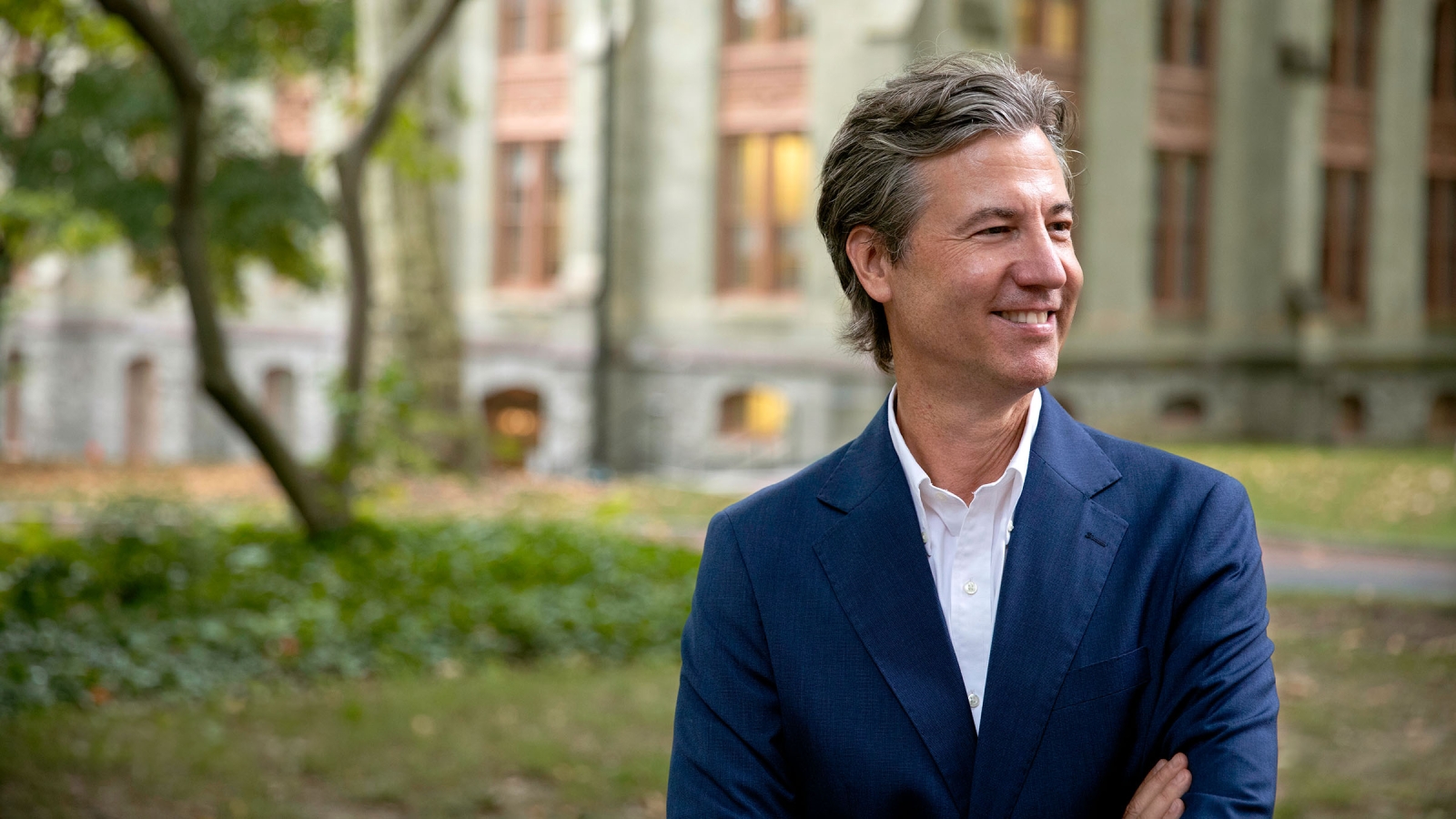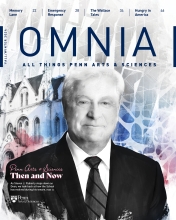A Champion for the Liberal Arts
Peter Struck, Vartan Gregorian Professor of the Humanities, shares his journey as an academic, an educator, and now, Stephen A. Levin Family Dean of the College of Arts & Sciences.

Peter Struck, Vartan Gregorian Professor of the Humanities, to a new role as Stephen A. Levin Family Dean of the College of Arts & Sciences (Image: Brooke Sietinsons)
Peter Struck has pursued a long and winding path through the liberal arts. A self-declared “classicist without a degree in classics,” Struck has never limited himself to one sector of the arts and sciences and is a firm believer in the experience of learning—what he calls “habits of mind”—instead of skill training alone. This road has led Struck, Vartan Gregorian Professor of the Humanities, to a new role as Stephen A. Levin Family Dean of the College of Arts & Sciences, succeeding Paul Sniegowski.
Struck’s academic and educational accolades are numerous. Two of his books won the Goodwin Award, the top prize in Classical Studies, making him the only scholar to win the award twice in its 70-year history. He has received prestigious teaching honors from the University and held leadership roles that further teaching and the liberal arts within and outside of Penn, including as chair of the School of Arts & Sciences Curriculum Committee and of the Department of Classical Studies. He also founded the National Forum on the Future of Liberal Education.
Struck thinks broadly about what a student’s time at college should be. To this end, he expanded the Benjamin Franklin Scholars program to include a first-year curriculum and a residential component. He was also one of the first faculty members to engage in online instruction and has continued to teach a summer online course via the College of Liberal & Professional Studies; his Greek and Roman Mythology massive open online course (MOOC) has enrolled more than 250,000 students to date.
As Struck embarks on his new role as dean, he shared with Omnia how he came to love the liberal arts, what it’s been like working to rejuvenate general education at Penn, how he thinks the liberal arts can meet the challenges of new technologies like AI, and more.
You are a lifelong advocate for the liberal arts. Why are they so foundational to education?
Liberal arts are liberal because they’re liberating. They help you think in a broad way, and they free you from mistakes and misimpressions and fearfulness about the world, as well as doubts about your own agency. The liberal arts are empowering, and we want to introduce our students to that so they can steer their own ships. There are a thousand kinds of intelligence out there. Different disciplines organize their picture of the world differently, and finding the discipline that organizes the world the way you see it will set you up to thrive.
What were your early experiences with the liberal arts? What led you to classics?
My own path through the world of arts and sciences started in high school. I had always loved math and science. I thought it was the most amazing thing I’d ever studied, to do calculus and physics at the same time, and the world was all of a sudden explainable in ways it wasn’t before. Then, during my first year at the University of Michigan, I took a class called Great Books and read Homer’s Iliad. I was just blown away by how much I could relate to it and also by how strange it was. It was one of those moments when you think, wait, if this is out there, what else am I going to find?
These were human beings whose reactions and interactions with the world I could recognize, but the common sense they were using to negotiate all these complicated experiences was quite different from my own. It had a kind of uncanny feeling. These were people who were like me but also not like me. I later wrote my thesis on James Joyce’s Ulysses and Homer’s Odyssey, and then I completed a PhD in comparative literature in Chicago.
I started at Penn in fall of 1999, and I’ve been in the Classical Studies Department for 25 years, where I was chair from 2017 to 2023. None of the degrees that I have attached to my name are in classics, which is non-standard for my field. My colleagues at Penn luckily were open-minded enough to think I made sense in the department, and it has been just a wonderful home for me. It’s filled with incredibly accomplished scholars working at the very highest levels. Working alongside them has enabled me to do my best work.
How would you describe your tenure as director of the Benjamin Franklin Scholars?
The liberal arts changed my life, and I want as much as I can to try to help other people find the amazing power in these ideas. So, I talked to the dean at the time, Dennis DeTurck, and said, “What if we built a first-year curriculum into Benjamin Franklin Scholars (BFS) that was intensive liberal arts?” What I wanted to do is to attract the kind of students who come to Penn, who want to do liberal arts because it’s hard. I wanted folks who were thinking about every side of the problem, who weren’t satisfied with simple answers.
We built Integrated Studies around core themes—one in the fall, one in the spring—that vary year to year. We organized parallel introductory courses taught by faculty from disciplines far apart from one another. For instance, there was a course called Human Nature, which had an anthropologist, a biologist, and me, a classicist, talking about how each of our fields defined human nature. This led to all kinds of interesting insights and back-and-forth around the similarities and differences in how fields organize their understandings of the world.
We also started a residential program for BFS scholars to introduce people to thinking about their learning as more than a set of assignments in a classroom or readings on a syllabus. We wanted to demonstrate to these students that a really great education will leak into all parts of their lives, including their residential lives, so we created an environment that had the best chance to produce that.
We ask BFS students to pick a Benjamin Franklin quote to put on their class T-shirts, and they never pick “A penny saved is a penny earned.” They pick nearly every year, “The noblest question in the world is, what good may I do in it?” Our students want that from college—that’s what they want—so we need to do our best to provide it to them.
You’ve been involved in reevaluating the curriculum’s general education requirement. Can you describe that process?
In the past couple of years there have been conversations inside the College and in different faculty committees about our current general education. It was instituted 20 years ago, and a lot has changed since then in our faculty’s thinking. Our world has changed and our students have, too. We want to simplify general education and make it legible to the first years and to their parents. I want it to make a clear statement about what liberal arts is. Our founder was a practical man, and when I talk about how important it is to pursue ideas for their own sake, which is where my heart and soul are happiest, I don’t mean I think a person should take time smelling the roses. I like flowers as much as the next person, but I don’t think that’s what we’re doing in the arts and sciences. Truly good ideas have the power to move the world.
People learn skills their whole lives, and if you think of yourself as a kind of skills-acquisition machine—well, OK, it’s good to have skills—but in college, you can do much more than that. You can learn the fundamentals of how it is you think in the first place. How do you gather evidence? How do you decide whether this or that evidence is the right data to be using to solve the problem? How do you draw inferences that are fair and not tendentious? How do you see past your own blind spots to see the world the way it really is? A good education should instill the habits of mind that let you do those things, which will also give you the most prosperous future for yourself in all ways, including personal fulfillment, happiness, family life, community engagement, and professionally.
What are some key challenges the liberal arts face today?
I think the biggest challenge the liberal arts face right now is one of messaging. The choices of major and what students study are important, but they’re important for probably a different reason than folks might think. The social scientist Richard Detweiler has demonstrated that the best indicator of future success isn’t the major, it’s the number of courses taken outside the major. Breadth is the real key.
When our students go out into the wider world, in the first year, 93 percent of them are settled into their careers or are in graduate school. They go to med school and law school, and advanced studies of all kinds, and many go into financial services and consulting, too. They’re prepared for anything. Sometimes our students think that if they major in a liberal arts discipline, it may limit their career choices, but that’s just not true. We need to get them on the other side of that.
How do the liberal arts fit with AI advancements like ChatGPT?
The kind of knowledge that we’re pursuing in the arts and sciences is more important than ever. ChatGPT is showing us what happens when machines can mimic thinking. It is absolutely critical to have the habits of mind to understand when data are being cherry-picked and when arguments are forced. Our world is changing, and things that are knowledge-adjacent are spinning out of control, so the ability to know the difference between what really counts as knowledge and what doesn’t is crucial. And I don’t see that changing. In fact, I see that accelerating.
College-level studies across the board will assess AI in different ways, but I think in the liberal arts, we are uniquely suited to say of that assessment process, “That’s what we do.” On the one hand, there’s data, and on the other hand, there’s knowledge, and we focus on how you get from the former to the latter. That’s it. That’s what we do.
You chaired the School’s Continuing Education Committee. What is the importance of non-conventional and continued education?
Sometimes people think, “What are you talking about with this ‘ideas stuff?’ That’s an elitist thing.” But, entering into the continuing education space and the MOOC space, we’re talking about much broader populations, who haven’t been through the super-intense admissions route that you get at places like Penn. They have all kinds of backgrounds and all kinds of different perspectives on the big questions in life like, “Why are we here?” “Do we have souls?” “What’s justice?” “How do we pursue it?”
These are questions at the center of the liberal arts, and they appeal to everybody. You can bring them to any population—and I would not restrict who I think those questions are pertinent to.
What is something non-academic you’d like to share about yourself?
There’s nothing in life that I like doing more than going out to dinner with friends in the city of Rome. It’s an hours-long embrace of the best parts of life. I could also add that I’m a huge fan of David Lynch films. I like to go on runs with my dog, Blue. She’s getting old, and so am I, but she gets me out and moving around. You might see me on campus with her. She’s a friendly one—she might come over to say hello.



